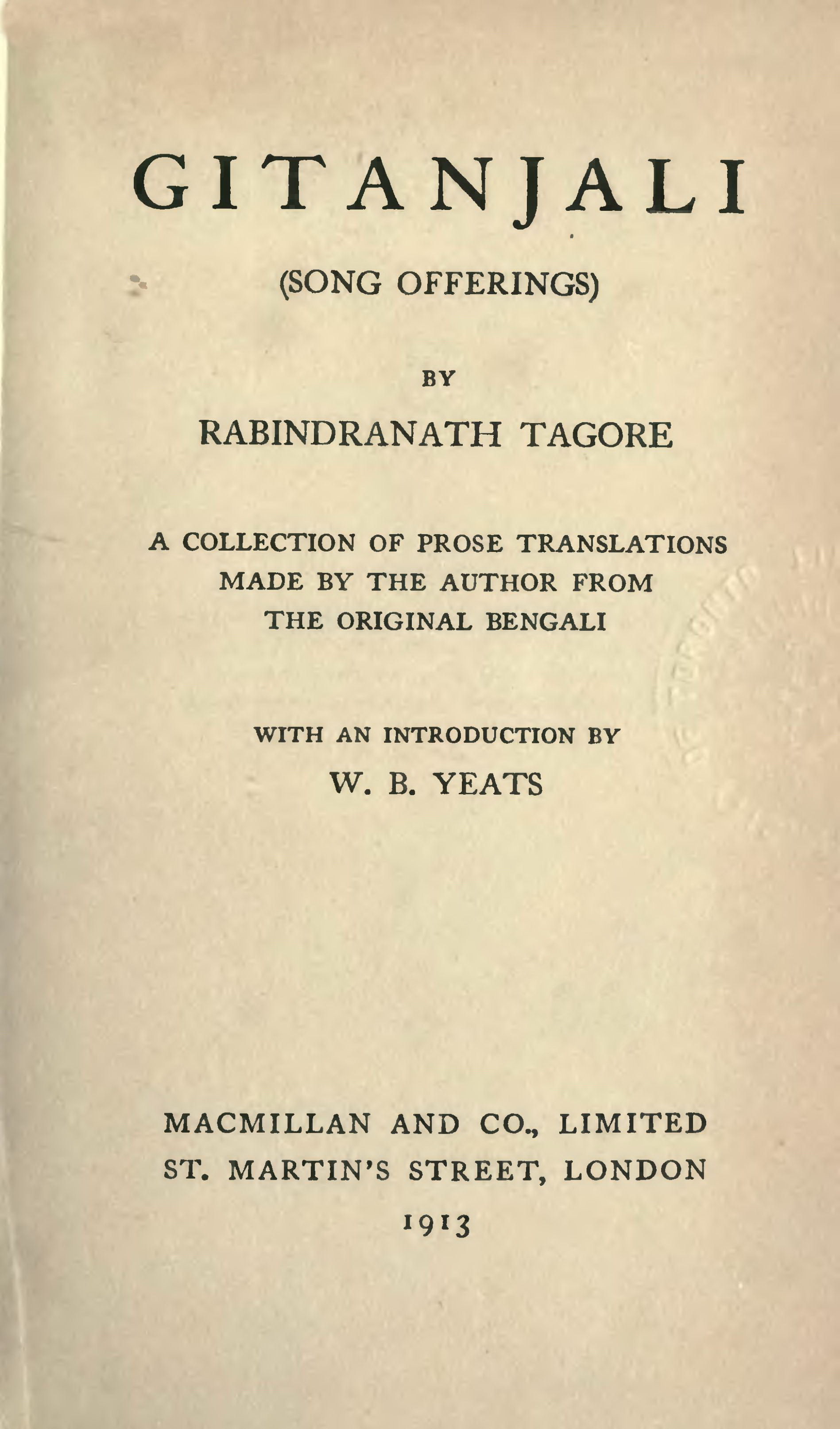And last but not least, today, the last day of National Poetry Month, we have some poetry from the first Indian to win a Nobel Prize - Rabindranath Tagore, who was the first Indian to win the Nobel Prize; he won it in 1913 when India was still under the British empire and remains to date the only Indian to win this prize for Literature. As the poet who penned Jana Gana Mana, the Indian national anthem and Amar Shonar Bangla,
the Bangladeshi national anthem, he is surely the only person whose
works went on to become the national anthems of two nations!
The Gitanjali or `song offerings', with an introduction by William B. Yeats, is his famous work and I thought I would excerpt a few "songs" from it but how does one choose from a body of work which, I think, needs to be read in its entirety.
So, first-up, here is a link to the entire text of the Gitanjali, which is in the public domain according to the Berne convention since January 1st 1992.
~*~
And here are four poems from the book, from this website:
Song Unsung
The song that I came to sing remains unsung to this day.
I have spent my days in stringing and in unstringing my instrument.
The time has not come true, the words have not been rightly set;
only there is the agony of wishing in my heart.
The blossom has not opened; only the wind is sighing by.
I have not seen his face, nor have I listened to his voice;
only I have heard his gentle footsteps from the road before my house.
The livelong day has passed in spreading his seat on the floor;
but the lamp has not been lit and I cannot ask him into my house.
I live in the hope of meeting with him; but this meeting is not yet.
~*~
Lotus
On the day when the lotus bloomed, alas, my mind was straying,
and I knew it not. My basket was empty and the flower remained unheeded.
Only now and again a sadness fell upon me, and I started up from my
dream and felt a sweet trace of a strange fragrance in the south wind.
That vague sweetness made my heart ache with longing and it seemed to
me that is was the eager breath of the summer seeking for its completion.
I knew not then that it was so near, that it was mine, and that this
perfect sweetness had blossomed in the depth of my own heart.
~*~
Journey Home
The time that my journey takes is long and the way of it long.
I came out on the chariot of the first gleam of light, and pursued my
voyage through the wildernesses of worlds leaving my track on many a star and planet.
It is the most distant course that comes nearest to thyself,
and that training is the most intricate which leads to the utter simplicity of a tune.
The traveler has to knock at every alien door to come to his own,
and one has to wander through all the outer worlds to reach the innermost shrine at the end.
My eyes strayed far and wide before I shut them and said `Here art thou!'
The question and the cry `Oh, where?' melt into tears of a thousand
streams and deluge the world with the flood of the assurance `I am!'
~*~
Mind Without Fear
Where the mind is without fear and the head is held high;
Where knowledge is free;
Where the world has not been broken up
into fragments by narrow domestic walls;
Where words come out from the depth of truth;
Where tireless striving stretches its arms towards perfection;
Where the clear stream of reason
has not lost its way into the dreary desert sand of dead habit;
Where the mind is led forward by thee into ever-widening thought and action---
Into that heaven of freedom, my Father, let my country awake.
~*~
You can also read a few other poems by Tagore from my post during my 2011 NPM celebrations.
Incidentally, I don't think my father read much poetry in his lifetime and so I am pretty sure my father owned just one book of poems and that's the Gitanjali, which per a note on the first page he bought in 1960. (Will update a picture later; can't seem to find my camera right now!)
~x~
And that wraps up my National Poetry Month celebrations for 2013. I hope you enjoyed it.
I've featured 30 different poets this month many of whom have given me much pleasure over the years through their words and some of whose work I still need to read and explore more in the years to come.
I'll leave you with a link to a blog by a 10 year old I know (turns 10 later this year actually!) who taught me a thing or two about poetry -- like what a clerihew is! (His father is a very good friend of mine for over 20 years and is an amazing runer, with over 120 marathons run, but no poet! Neither does his mom read or write poetry. So this interest in poetry through some summer camps and workshops he attended last year is indeed commendable! Maybe some day 20 years from now I will feature him in a blog post all by himself, huh! ;-))
Alrighty then - now go ahead and read some poetry by this budding poet, Rishi Verma!
And do come back and visit my blog -- I hope to continue blogging about poetry, if not daily then at least once every week. This is subject to change but I am hoping I'll post one post about poetry every Friday now onwards.....










